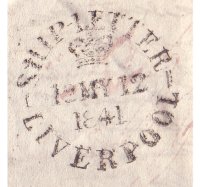Seapost -> Ship Letters
Ship Letters
By Julian H Jones
 The 1711 Act of Queen Anne regularised the handling of incoming mail to Britain by ship.
It allowed the Post Office to claim from recipients the 1d (one penny) per letter gratuity
paid to ships' masters for unloading their mail at the first opportunity on reaching British
shores. The recipient of the letter was also required to pay the inland postal charge
between the port of landing and the letter's destination. Prior to 1765 the inland rate
was simple: 3d for less than 80 miles from London and 4d for more than 80 miles.
The 1711 Act of Queen Anne regularised the handling of incoming mail to Britain by ship.
It allowed the Post Office to claim from recipients the 1d (one penny) per letter gratuity
paid to ships' masters for unloading their mail at the first opportunity on reaching British
shores. The recipient of the letter was also required to pay the inland postal charge
between the port of landing and the letter's destination. Prior to 1765 the inland rate
was simple: 3d for less than 80 miles from London and 4d for more than 80 miles.
 However,
from 1765 the inland rates became more complicated and soon hand stamps were in use at
the busier ports to confirm the port and distance rate due. Early uses of ship letter
marks include Liverpool (1757), Londonderry (1762), Dover (1765), London (1766), Deal and
Falmouth (1767).
However,
from 1765 the inland rates became more complicated and soon hand stamps were in use at
the busier ports to confirm the port and distance rate due. Early uses of ship letter
marks include Liverpool (1757), Londonderry (1762), Dover (1765), London (1766), Deal and
Falmouth (1767).

 The British ship letter system was used in the British Colonies and inherited by the United States,
including the rate progression by number of sheets in the letter. The hand stamps themselves
took on a variety of styles, starting with a straight line name of the port and progressing
through a number of boxed, oval and circular styles as well as the simple SHIP in conjunction
with another postmark.
The British ship letter system was used in the British Colonies and inherited by the United States,
including the rate progression by number of sheets in the letter. The hand stamps themselves
took on a variety of styles, starting with a straight line name of the port and progressing
through a number of boxed, oval and circular styles as well as the simple SHIP in conjunction
with another postmark.

 Prior to the mid 19th century mail was carried either by government packet or the much more
frequent private trading ships.
Prior to the mid 19th century mail was carried either by government packet or the much more
frequent private trading ships.
 Letters carried by these merchant ships are termed 'Ship Letters'
and include those carried on the early pioneer steamships which often competed with the government
contract packet ships.
Letters carried by these merchant ships are termed 'Ship Letters'
and include those carried on the early pioneer steamships which often competed with the government
contract packet ships.
 The sender in Britain could pay for transmission of their letter from an inland location to the
port and ship of their choice. Typically the cost to send mail abroad by ship was less than that
of the packet. Ship letter marks were also applied to outbound ship letters to indicate proper
payment of the fees. Prior to the negotiation of postal treaties it was still not possible to pay
the inland postage of the receiving country.
The sender in Britain could pay for transmission of their letter from an inland location to the
port and ship of their choice. Typically the cost to send mail abroad by ship was less than that
of the packet. Ship letter marks were also applied to outbound ship letters to indicate proper
payment of the fees. Prior to the negotiation of postal treaties it was still not possible to pay
the inland postage of the receiving country.
In the 1840's the British Post Office concluded contracts with first Cunard and then the Royal Mail Steam Packet Co. to carry mail across the North Atlantic. Similar contracts were established with the Peninsular and Oriental Steam Navigation Co for mails to India. These, and similar to Africa and Australia, were considered to be packet services which attracted different hand stamps, particularly those in regard to the postal treaty with the USA.
 However, letters continued to be carried on ships not under government contract, but
were mostly Bills of Lading concerned with items of cargo being carried on the ship.
However, use of ship letter marks continued into the
20th century.
However, letters continued to be carried on ships not under government contract, but
were mostly Bills of Lading concerned with items of cargo being carried on the ship.
However, use of ship letter marks continued into the
20th century.
A prime example of that is the Birmingham Ship Letter.
Inevitably letters posted to a passenger or crew member on board a ship simply missed the sailing! As many transatlantic steamers called at Queenstown, southern Ireland, the post office there held an array of Too Late Ship Sailed marks.
References
Robertson Revisited, Colin Tabeart, 1997 edition, James Bendon Ltd, Limassol, Cyprus
United States Incoming Steamship Mail, 1847-1875,
2nd Edition, Theron J Wierenga,
US Philatelic Classics Society, Inc.
United Kingdom Letter Rates, Inland and Overseas, 1635 to 1900, Colin Tabeart, Second Edition 2003, HH Sales Limited, Bradford

